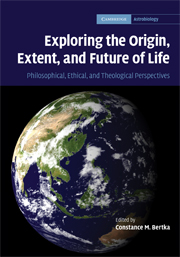 Exploring the Origin, Extent, and Future of Life
Exploring the Origin, Extent, and Future of Life Book contents
- Frontmatter
- Contents
- List of contributors
- Acknowledgements
- 1 Astrobiology in a societal context
- Part I Origin of life
- Part II Extent of life
- 7 A biologist's guide to the solar system
- 8 The quest for habitable worlds and life beyond the solar system
- 9 A historical perspective on the extent and search for life
- 10 The search for extraterrestrial life: epistemology, ethics, and worldviews
- 11 The implications of discovering extraterrestrial life: different searches, different issues
- 12 God, evolution, and astrobiology
- Part III Future of life
- Index
- References
9 - A historical perspective on the extent and search for life
from Part II - Extent of life
Published online by Cambridge University Press: 29 December 2010
- Frontmatter
- Contents
- List of contributors
- Acknowledgements
- 1 Astrobiology in a societal context
- Part I Origin of life
- Part II Extent of life
- 7 A biologist's guide to the solar system
- 8 The quest for habitable worlds and life beyond the solar system
- 9 A historical perspective on the extent and search for life
- 10 The search for extraterrestrial life: epistemology, ethics, and worldviews
- 11 The implications of discovering extraterrestrial life: different searches, different issues
- 12 God, evolution, and astrobiology
- Part III Future of life
- Index
- References
Summary
The premise of my chapter is that history can be not only enlightening in itself but also significant in a variety of contemporary contexts. One clear example of this is in connection with the theological, ethical, and philosophical implications of the search for life, because these issues have been addressed again and again throughout history as the possibility of life beyond Earth has been raised. It is true that most of the historical debate has centered on extraterrestrial intelligence rather than microbial life. But at least part of the interest in the search for microbial life is that it is an indication of the prevalence of intelligence in the universe. This explains in part the uproar over the claims for nanofossils in the Mars rock in 1996 – much more was at stake than primitive life on Mars itself. This connection between microbes and intelligence is made especially in the popular mind, despite the fact that many evolutionists would argue that the gap between microbes and intelligence is greater than that between life and non-life. Thus, Peter Ward and Donald Brownlee have recently, and famously, argued that the universe may well be full of microbes, but not intelligence, making ours a “Rare Earth”. If this is true, the study of the implications of microbial life beyond Earth is all the more important.
- Type
- Chapter
- Information
- Exploring the Origin, Extent, and Future of LifePhilosophical, Ethical and Theological Perspectives, pp. 167 - 185Publisher: Cambridge University PressPrint publication year: 2009
References
- 2
- Cited by


